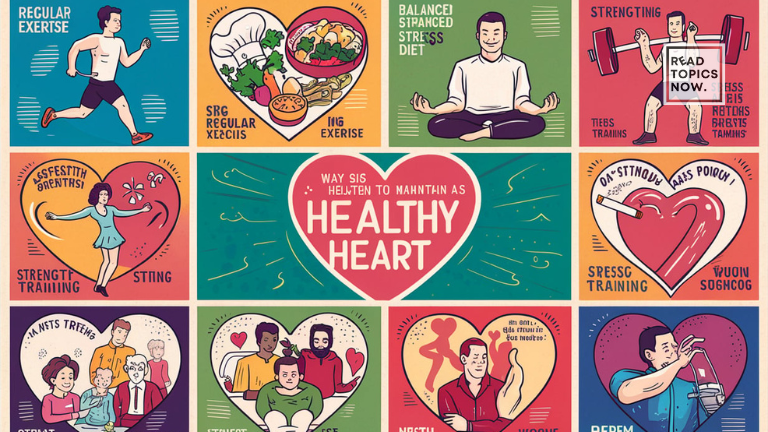
10 Ways To Keep Your Heart Healthy

10 Ways To Keep Your Heart Healthy
Heart disease is the leading cause of death for people in the United States. While some factors like genetics may increase your risk, you can significantly reduce your chances of heart problems by adopting a heart-healthy lifestyle. This article will guide you through ten effective ways to keep your heart healthy and strong.

1. Don’t Smoke or Vape
Most people know that smoking is linked to numerous serious health issues, including heart disease. Smoking causes inflammation and can increase the risk of atherosclerosis, a condition where fatty substances build up in the arteries and narrow them. Avoiding smoking is one of the most crucial steps you can take to lower your heart disease risk.
Tips to Quit Smoking:
- Seek support from friends, family, or a support group.
- Consider nicotine replacement therapy.
- Avoid triggers that make you want to smoke.
- Stay active to reduce cravings.
2. Eat a Heart-Healthy Diet
Diet plays a vital role in maintaining a healthy heart. The Mediterranean and DASH diets are particularly beneficial for heart health.
Mediterranean Diet:
- Emphasizes healthy fats and fresh ingredients.
- Encourages consumption of vegetables, fruits, whole grains, and legumes.
- Includes moderate amounts of fish, dairy, and wine.
Read: 50 Statistics Related to Cardiovascular Diseases You Must Know
DASH Diet:
- Focuses on reducing high blood pressure.
- Allows more dairy products and meat compared to the Mediterranean diet.
Foods to Include:
- Plenty of vegetables and fruits.
- Whole grains and pulses.
- Healthy fats like olive oil, avocados, seeds, and nuts.
- Moderate amounts of fish, dairy, and poultry.
Foods to Avoid:
- Red meat.
- Processed foods.
- Sugary beverages and sweets.
3. Get Plenty of Sleep
Adequate sleep is crucial for heart health. Most adults need between seven and nine hours of sleep per night. Poor sleep can lead to high blood pressure, weight gain, and a lack of motivation to exercise.
Tips for Better Sleep:
- Maintain a regular sleep schedule.
- Create a relaxing bedtime routine.
- Keep your bedroom cool and dark.
- Avoid screens before bed.
4. Keep Your Blood Pressure in a Good Range
High blood pressure, or hypertension, is a major risk factor for heart disease. Regularly monitoring your blood pressure and maintaining it within a healthy range is essential.
Lifestyle Changes:
- Reduce sodium intake.
- Eat a balanced diet.
- Exercise regularly.
- Limit alcohol consumption.
Medications:
- Follow your healthcare provider’s advice.
- Take prescribed medications consistently.
5. Limit Alcohol
While moderate alcohol consumption, such as a glass of red wine, has been suggested to have some heart benefits, it’s important to consume alcohol in moderation. Excessive alcohol intake can harm your heart.
Recommended Alcohol Intake:
- Women: No more than one drink per day.
- Men: No more than two drinks per day.
Tips for Reducing Alcohol Consumption:
- Choose alcohol-free days.
- Drink slowly and savor your drink.
- Opt for non-alcoholic alternatives.
6. Maintain a Healthy Weight
Being overweight or underweight can increase your risk of heart disease. Maintaining a healthy weight through a balanced diet and regular exercise is essential for heart health.
Strategies for Weight Management:
- Set realistic weight loss goals.
- Track your food intake and physical activity.
- Choose nutrient-dense foods.
- Stay active with regular exercise.
7. Prevent Infections
Infections can increase the risk of heart disease. Taking steps to prevent infections can protect your heart health.
Steps to Prevent Infections:
- Wash your hands regularly.
- Maintain good dental hygiene.
- Stay up-to-date on vaccinations.
- Practice safe food handling and preparation.
8. Reduce Stress
Chronic stress can negatively impact your heart. Managing stress through relaxation techniques can improve your overall well-being.
Relaxation Techniques:
- Deep breathing exercises.
- Meditation.
- Yoga and tai chi.
- Progressive muscle relaxation.
9. Stay Physically Active
Regular physical activity strengthens your cardiovascular system. Aim for at least 150 minutes of moderate-intensity exercise per week or 75 minutes of vigorous activity.
Tips for Staying Active:
- Find activities you enjoy.
- Set achievable fitness goals.
- Mix different types of exercise.
- Stay consistent with your routine.
10. Visit a Healthcare Provider for Regular Health Screening Tests
Regular health screenings can help detect heart disease early, making it easier to manage. Your healthcare provider can recommend how often to monitor key health markers.
Key Health Markers:
- Blood pressure.
- Cholesterol levels.
- Blood glucose levels.
- Waist circumference.
- Weight.
Conclusion
Heart disease is the leading cause of death in the United States, but it can often be prevented through a healthy lifestyle. By adopting habits like eating a balanced diet, staying active, getting enough sleep, and avoiding smoking, you can significantly reduce your risk of heart disease. Regular visits to your healthcare provider for screenings are also essential to keep your heart in check.
FAQs
1. What is the best diet for heart health?
The Mediterranean and DASH diets are highly recommended for heart health due to their emphasis on whole foods, healthy fats, and minimal processed foods.
2. How much exercise is needed for a healthy heart?
Aim for at least 150 minutes of moderate-intensity exercise or 75 minutes of vigorous activity each week.
3. Can stress really affect heart health?
Yes, chronic stress can lead to high blood pressure and other heart-related issues. Managing stress through relaxation techniques is beneficial.
4. What are the early signs of heart disease?
Early signs can include chest pain, shortness of breath, fatigue, and irregular heartbeat. It’s important to see a healthcare provider if you experience any of these symptoms.
5. How often should I get my heart health checked?
The frequency of health checks depends on your individual risk factors. Generally, annual check-ups are recommended, but your healthcare provider can give you a personalized schedule.
Get Curated Post Updates!
Sign up for my newsletter to see new photos, tips, and blog posts.






